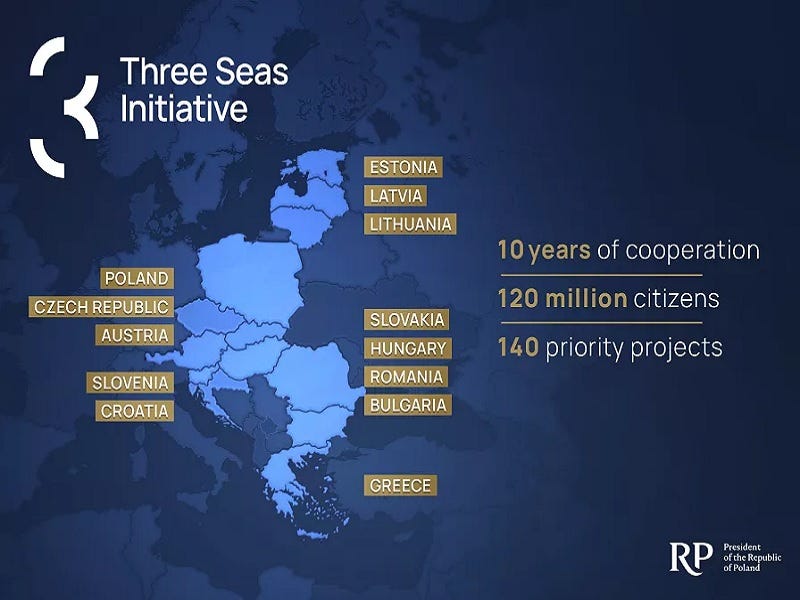Russia considers it to be a series of military logistics projects sold to the public as economic ones.

The 10th Summit of the “Three Seas Initiative” (3SI), which refers to the jointly Polish- and Croatian-founded platform for fostering Central European integration, concluded in Warsaw in late April. Their joint statement, the Ukrainian-relevant paragraphs of which Hungary disassociated itself from, declared that Spain and Turkiye will join the European Commission, Germany, Japan, and the US as strategic partners while Albania and Montenegro will join Moldova and Ukraine as associated participating states.
Paragraph 13 reaffirmed the member states’ commitment to implementing six Three Seas Priority Projects: BRUA (Bulgaria-Romania-Hungary-Austria gas pipeline), expanding the capacity of Croatia’s LNG terminal on Krk island, Rail Baltica, Rail2Sea, Via Baltica, and Via Carpatia This link here from the 3SI’s official site lists all their other projects and helpfully displays them on a map too. Upon completion, these projects will strengthen economic and military integration, which will shape post-conflict Europe.
France, Germany, and Poland are competing for leadership in this emerging era, the dynamics of which were analyzed here, with Poland poised to leverage its leading role in the 3SI in order to give itself an edge and also advance its vision of becoming the US’ top partner in Europe. From the US’ strategic perspective, the 3SI could become the means through which Poland could restore part of its lost regional power status in modern conditions, which could create a wedge between Western Europe and Russia.
At the same time, some in Germany consider the 3SI to be a means for further expanding their trade with the EU’s formerly communist countries, while France might conceptualize it as a means for expanding its own Romanian-centric influence in the region throughout the rest of Central Europe. This convergence of interests through the 3SI in spite of France, Germany, and Poland’s competition for leadership of post-conflict Europe raises the odds of the previously mentioned projects’ implementation.
They all serve dual military purposes too with respect to what’s now known as the “military Schengen”, which is aimed at facilitating the free movement of troops and equipment throughout the bloc, obviously in the eastern direction as part of its contingency planning vis-à-vis Russia. The BRUA and Krk projects are also of military value since they diversify the EU’s energy import routes. The 3SI is accordingly seen by Russia as a series of military logistics projects sold to the public as economic ones.
.

.
Even more concerning from the Kremlin’s perspective is that the 3SI gathers together Europe’s most politically Russophobic countries, thus ensuring that this platform will prioritize its unstated military purpose over its economic one. This raises the likelihood that the US will exploit the 3SI as a wedge for preempting any potential rapprochement between Western Europe and Russia, though the US could also exert positive influence over these same countries to deter them from provoking a conflict with Russia.
Whatever ends up unfolding, it would be a mistake to ignore or deny the prominent role that the 3SI will play in post-conflict Europe, even though it’s premature to predict how it’ll influence the dynamics between France-Germany-Poland (both among themselves and as a whole), the US, and Russia. Observers should therefore monitor the implementation of its previously mentioned priority projects, the involvement of the 3SI’s various strategic partners in each, and the way in which they’re militarized.
*
Click the share button below to email/forward this article. Follow us on Instagram and X and subscribe to our Telegram Channel. Feel free to repost Global Research articles with proper attribution.
Andrew Korybko is an American Moscow-based political analyst specializing in the relationship between the US strategy in Afro-Eurasia, China’s One Belt One Road global vision of New Silk Road connectivity, and Hybrid Warfare. Visit his blog here. He is a regular contributor to Global Research.
Featured image: 2018 Three Seas summit in Bucharest (Licensed under CC BY 2.5 bg)
Global Research is a reader-funded media. We do not accept any funding from corporations or governments. Help us stay afloat. Click the image below to make a one-time or recurring donation.
Counter Information publish all articles following the Creative Commons rule creative commons. If you don't want your article to appear in this blog email me and I will remove it asap.




















No comments:
Post a Comment